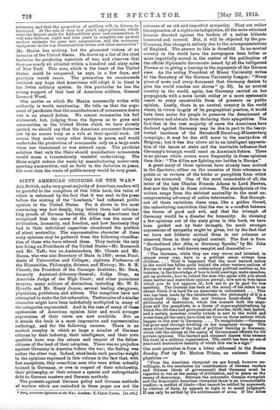BOOKS.
DEFENCELESS AMERICA.*
la this book Mr. Hudson Maxim has virtually followed the argument of General Homer. Lea in The Valor of Ignorance, but he has done it with a liveliness and enthusiasm all his own and with many "modern instances" from the present war. We may not agree with all Mr. Maxim's philosophy, and for our part we do not, but no one who is not what Mr. Maxim calls an " ego-fanatic " can possibly deny his proposition that the United States is, in a military sense, living in dreamland. Her whole foreign policy is based on the Monroe Doctrine, and the Monroe Doctrine is based on an almost complete power- lessness. Never was such a paradox. An American writer has said that the Idodroe Doctrine is " the most magnificent bluff in all history, and so far the most successful." We agree. The great " hands-off " Doctrine is bluff in that it is unsup- ported by the force necessary to maintainAt if challenged; but it is none the less a moat beneficent and convenient instru- ment. It rules out from the wrangles of European diplomacy almost the whole of the Western world. For that reason we are entirely friendly to the Doctrine even in applications of it which would make Monroe himself open his eyes very wide. We trust that it will never be challenged, but we feel with Mr. Maxim that it almost certainly will be some day. We inspect that if Germany were to win the present war the challenge would come just as soon as she was strong enough to deliver the challenge. We cannot imagine how thinking Americans rest quietly in their beds some- times when they reflect on the paradox of their position. On the continent of South America are rich and growing Republics that resent the magnificent tutelary phrase with which the United States encompasses them. Then there is Japan. One would think that every time there was a racial riot in a Pacific town good Americans would almost jump out of their skins at the thought of what it might lead to. But nothing of the sort happens. Good Americans, luckily for their peace of mind, dream on. The world is still for them the Arcadia in which splendid isolation was not only possible but virtuous.
• &fowler America. ny Hada= Karim. New York; Hearer's Inter. salleast Lilnary Co. Mr. Maxim shows his countrymen the precise extent of their powerlessness. He has apparently given up hoping, however, that any one will wake them up by telling them the facts. He remarks that many Americans regard all armaments as frills. They look upon their Fleet as a thing which respectability requires a Great Power to possess, but not as having other uses. It is brought out for show on festive occasions. Lord Roberts did not wake up Britain ; why should any public man expect to wake up America P In Mr. Maxim's belief, the awakening will come through a war. He regards war as inevitable. He predicts that the United States will have to fight Germany, or Japan, or—Britain! Mr. Maxim calls to mind how a Japanese diplomatist once said to him: "Von have a Monroe Doctrine —America for the Americans ; we also have a similar doctrine, Asia for the Asiatics; but we are not ready to enforce ours yet, and you are not ready, and are not likely to be ready, to enforce yours. A little later we shall inquire by what logic you can proclaim America for the Americans, and disclaim our right equally to proclaim Asia for the Asiatics." It is kind of Mr. Maxim to say that he would much rather be conquered by England than by any other Power. Americans, he says, "must first be whipped in order to prepare sufficiently to prevent being whipped. Therefore our business at the present time is to pick our conquerors. I choose England! I would much rather see the genial face of the British Tommy Atkins than the stern mystery of the Japanese face." Apart from the geniality of the British soldier, Mr. Maxim chooses England because she has no territorial ambitions. "She would be satisfied with a good big indemnity, which we could well afford to pay for the benefit we should gain from the war." Mr. Maxim believes, in fine, that the aftermath of the present war will be another war which will involve the United States :— " It is my opinion that, whichever side wins, the United States will likely have to fight the winner within a short time after the war is over, for neither the Germans nor the Allies, in the heat of passion that now dominates them, will be in is mood to forgive some of the things that we may feel compelled to do in the main- tenance of our neutrality. In short, the things that we may be led to do to avoid being embroiled in the present war may serve to embroil us with the victors, unless the war should end in a draw.'
W. G. Sumner wisely said: "If you want war, nourish a doctrine." He explained that a doctrine gets inside a
man's own reason and betrays him against himself. At
all events, if the United States wants to live in perpetr el peace, she has in the Monroe Doctrine something working
heavily against her both inside her own mind and exter- nally in restless and dissatisfied foreign countries. The Monroe Doctrine is rather like the notice " Beware of the
dog !" put up where there is no dog. The notice suggests to the predatory soul that it shields things worth having, and when he finds out that there is no dog it becomes an incite. went rather than a warning.
As regards the military weakness of the United States, Mr. Maxim says that the country has only between forty and
fifty million pounds of smokeless powder, whereas it ought to have five hundred million pounds. On the subject of artillery be quotes the following remarkable statement from the Scientific American :— .‘ We have in the hands of troops, or stored, 634 completed guns. We have under manufacture or contract, 226. These guns will probably not be completed for at least a year and a half. In other words, the number of completed guns is a little less than half the total number deemed necessary for the field force of 500,000 men, and provides no Funs whatever for the coastguard troops or new volunteer organizations which will be required in addition to the 600,000 field force. Of ammunition, we have, made and under contract, approximately 30 per cent. for the entire project of guns (1,292). Mil of this is under manufacture or contract, so that there is not more than 16 per cent. actually com- pleted. For the guns on hand and under manufacture we have, of ammunition on hand and under manufacture, about 41 per cent., actually on hand, approximately, 20'5 per cent. For the guns actually made (034) wo have 27 per cent. of the ammunition necessary. For the guns now in the hands of the regular army and militia we have about 44 per cent, of the ammunition necessary. It should be remembered, however, that the guns in the hands of the regular army and militia at the present time are loss than half the guns required for these forces when properly equipped with guns, oven under our scheme for the assignment of guns and ammunition, which is in both instances far lower than in any of the great armies today, and the present war has indicated, in the case of one great power at least, that the Cella gumption of ammunition has exceeded twice their maximum estimates, and that the proportion of artillery will, in future. be increased. At the rate of even last year's appropriations, which were the largest made for field-artillery guns and ammunition, it will take between eight and nine years to complete our present modest estimate for guns and ammunition, and the necessary equipment in the way of ammunition trains and other accessories?' Mr. Maxim has nothing but the gloomiest visions of an invasion of the United States. He draws up a list of the chief factories for producing materials of war, and observes that they are nearly all situated within a hundred and sixty miles of New York. This area, which is the heart of the United States, could be conquered, he says, in a few days, and paralysis would ensue. The precaution he recommends (without any hope that Americans will adopt it in time) is the Swiss military system. In this particular he has the strong support of that best of American soldiers, General Leonard Wood.
One matter on which Mr Maxim necessarily writes with nuthority is worth mentioning. He tells us that the argu- ment of pacificiete that the manufacturers of armaments desire ever is en absurd fiction. We cannot summarize his fell statement, but, judging from the figures as to guns and ammunition in the United States which we have already quoted, we should say that the American armament factories are by no means busy as a rule at their special work. Of course they make many other things in peace, and would undertake the production of armaments only on a large scale when war threatened or was entered upon. The pacificiet solution that only the State should manufacture armaments would mean a tremendously wasteful undertaking. The State might reduce the waste by manufacturing motor-cars, sporting ammunition, and so forth in the factories in peace, but even then the waste of public money would be very great.



































 Previous page
Previous page